There are many people who have shun fast-paced urbanised life for a rural life nestled in nature where peace of mind is the most sought after commodity
In this globalised world, many are seeking traditional, rural ways of living to make sense of their life. They don’t hate the urbanised world, but a life close to nature helps them explore their potential to the fullest. They seek to connect to their roots. Here’s are some exceptional stories:
Karan Dass and Akshay Radia are in their late 30s, run a farm in Vrindavan apart for other things.
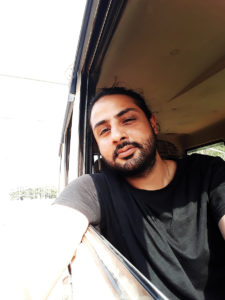
Karan Dass and Akshay Radia, both in their late 30s, have been friends since their school days in British School, Delhi. Their parents are Indians, but they grew up in different parts of the world. Karan spent a sizeable part of his growing up years in Sri Lanka and Australia apart from India. He is an Australian while Akshay is British by nationality. However, they have made a home in their parents’ country: denizens of the NCR.
Five years ago they formed an ecological partnership and started a 50-acre farm called Vihar Van in Vrindavan-Mathura, about a couple of hours drive from the capital — that’s if the traffic is flowing. The fact is that they decided to farm together, though neither of the is two financially depended on it, it is not their prime occupation. Karan is a trained architect who likes to describe himself as a designer, and Akshay is an entrepreneur, belonging to an affluent family of doctors who own Neyati group of hospitals.
They are urban lads by all description who took a liking for one of the most primitive occupations in the world, farming, and that too in the traditional ways, shunning the use of chemicals and pesticides. They prepared the land for organic farming, which took them more than three years. It’s not easy to get rid of the chemicals from the soil: making amends for past mistakes may take longer than one thinks.
A big gaushala or cowshed nearby is handy, for they get a ready supply of cow dung and urine that are amongst the best organic manure to rejuvenate the topsoil. And, in case you’re wondering, they are not Sanghis. They are sauve English speaking young men who take their life seriously and believe in pursuing their dreams to a logical conclusion.
They spend a substantial amount of time on the farm, mostly during the winters, grow ayurvedic medicinal plants —tulsi, ashwagandha, also drumstick, potatoes, tomatoes and onions, to name a few.
The business has survived because Akshay has deep pockets, and made some pragmatic linkages like a substantial part of the produce supplied to the Nayati hospital in Mathura. They have ensured backward integration so the money keeps flowing, in the process patients can sample pure organic food as they convalesce. Also, the produce is sold in a local mandi, so if you’re lucky you might get organic food for the price of the usual chemical-infested one.
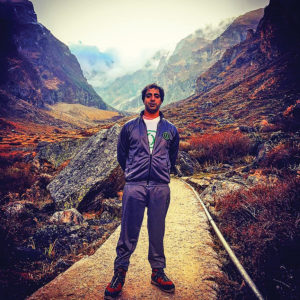
This collaboration between two dear friends — they are so close they discuss their dreams–did not come easy. Akshay likes to play with ideas, and Karan is fairly methodical in giving his friend reality checks. Akshay is a guy with insatiable energy and will to transform ideas into working models. They would have discussed some “200” ideas — all in the domain of implementable–but when farming was offered as a field where the two friends can work together to make a difference, Karan didn’t take long to say, “I’m in. What do you want?” Karan looks after the structural aspects of the farm, while his friend deals with business end.
Karan described in detail his life sitting in a cafe in Noida not far from where he lives in Sector 78 with his mother. He talks about his innate connection with “lines” and as a designer how he learned to look at things in a way very few can. “I love to draw. I love to create,” he speaks English with an Australian accent. The words come out quickly, sometimes too fast to keep tabs, nevertheless, he is an effective communicator. He takes pride in the way he’s designed the farm, which is the only green patch in the otherwise brown dusty landscape if one was to have an aerial view.
Karan also talks about the retail end of the business. The Sunday organic market, they call it EPIC — a euphemism for the Ecological Partnership Integrated Community — is held in Cyber Hub, Gurgaon.
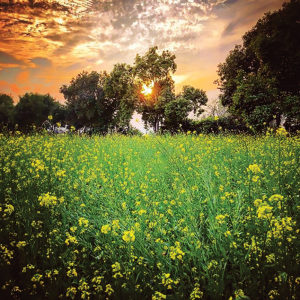
This transition to a more rural way of life is not about hating the city. Though pollution remains a concern, they have a zest to explore life in all its complexities and manifestations. Karan almost gets poetic to explain what it is: “My eyes are open. This is the life I want to live. Need something else. Variety. All of it. I want to live well and die well.”
Ashhar Farooqui and Neha Dikshit, live in a mudhouse near Nathuakhan in Uttrakhand
Ashhar Farooqui has been a hill person since his childhood. He wanted to be an English teacher in a residential school in the hills. Now in his 30s, he did make a house on the hill but opted for a profession of a musician.
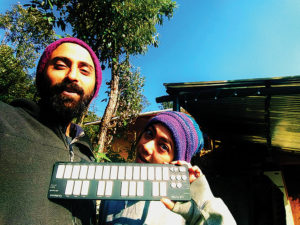
He lives with his partner, Neha Dikshit, a journalist formerly working with NDTV, in a mud house nestled on the slope of a green hill overlooking a deep valley surrounded by steep hills, a stream crisscrosses the valley beneath a glowing blue sky. They live near Nathuakhan in Uttrakhand with their, currently, four dogs who remain unleashed and are not trained to behave in any un-dog-ly, (read ungodly) manner. There was a time when they had co-hosted 13 dogs.
They grew up in Delhi, are city folk, and don’t hate urban life. It’s just that a home in the hills offers them an affordable alternative. “I could concentrate on music without the pressure of an expensive lifestyle,” explains Farooqui. Here in their mud house, they had the time and energy to pursue their respective passions. Neha who makes documentary films, adds, “In Delhi all one could afford was a pigeon hole for which one is required to repay (loan) for the rest of your life.”
This decision to live in the hills in a mud-house may seem radical but was a prudent move. Neha samples a simple life, her needs are limited. A place nestled in nature gives her the mindspace she needs to work. And more importantly, “We are not controlled by demanding lifestyle,” agrees Farooqui sipping his coffee in a restaurant in Delhi’s Khan Market.
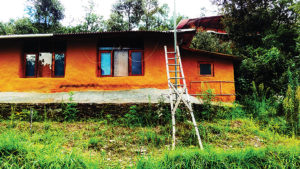
By divine providence, they found affordable land in the hills some eight years ago. Farooqui moved in early and started living in a rented accommodation not far from where he’d build his home. The fast internet connection ensured that he is notionally connected to his other band members scattered all over the country. He travels for gigs all over the world but makes music in his studio. Now they have three mud structures, their living space, and one studio each for the two of them. Farooqui loves to make music in the seraphic serenity of his home.
The mud house is a product of their insatiable desire to lead an experimental yet economical and ecologically sustainable life. They took the services of a friend who’s an expert, and now they have a durable house made of mud that’s cool in summer and locks the heat when it’s freezing during the winter. But all this didn’t come as easy as it seems. Neha opted for a consultancy position from a full-time position at the NDTV, which meant a big pay cut. “But then I don’t need much,” Neha asserts. That allowed her to spend more time in the hills.
The two of them are there for at least nine months of the year. They make frequent trips to Delhi for work and to meet friends. Staying in the hills has changed the way they view Delhi. “Now I look forward to coming to Delhi, which I considered a shithole when I lived here,” says Farooqui. Things and places do look different from a distance. “I don’t miss people but I do think about friends,” says Neha, “when I’m in Delhi meet up with friends and compensate for my absence.”
And don’t they get tired of each other — just the two of them sort of marooned in the wildness? That doesn’t happen because we lead busy lives and have separate studios. On the contrary, “We’re happy being here.” And the reason for it, they explain, is that they have a good relationship with their own self as they have ample opportunity to “introspect”. “We love our life outside work,” adds Farooqui.
Having made a house in the hills where they have been living for five years now, both young and open to possibilities, they consider their life here as merely a “transition” and that they might not be living here “forever”. Till the time they do, it makes perfect sense.
Ishaan from California
An Iranian second-generation American, born and raised in California, living in Delhi for nearly a year, calls himself Ishaan, and doesn’t want to reveal his ‘Islamic name’ for fear of retribution and the likelihood of posing an impediment for his quest.
He is clad in sleeveless vests, a khadar coat, wrapped in a shawl, baggy harem pants caught in at the ankle and a black sneaker with white laces. His attire affirms his break from the culture he grew up in. Comfort is what guides his clothing choices, and he doesn’t shy away from telling jeans-clad natives, “How can you move around in this constrictive clothing?”
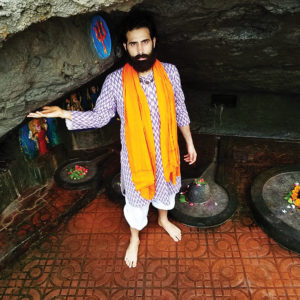
At 31, Ishaan is receptive, open and always in this assimilative mode. He’s knowledgeable, knows what he’s talking about, has read up some of the ancient texts, collaborated with academics who specialise in the oriental world, understands both the science and various traditional, alternative ways of healing and medicine. He’s full of details, knows more than one soul can carry, but hasn’t lost sight of the larger picture. He isn’t boasting when he asserts, “I have done it all”.
A brave man who’s trying to adopt a traditional, organic way of life in an alien land — India—where for reasons unknown the traditions have survived for centuries at a fairly large scale. Alone in this dense, demanding and diverse Delhi, you can’t blame him if he gets paranoid at times.
Ishaan grew up in Los Angeles, mingled with different cultures of the world fairly early in life, and would attend various gigs, he particularly mentions “transformational festivals.” Developed passion for mindfulness practices, Ayurveda, alternative healing traditions that would guide his future life decisions.
Ishaan talks passionately about his life so far sitting out in the open on a sunny afternoon. He established a prolific career in the health and wellness sector before he set out on an exploratory journey to India — in quest of a “fulfilled life” for himself and others.
Ishaan’s parents migrated from Iran during the Islamic Revolution of 1979, settled in California and set up a family business. A couple of years ago, Ishaan left a sanitised life for an existential adventure, in the quest for a fulfilled life. He knew this was not possible in America, as the laws and regulations are fairly strict and restrictive, for him to experiment with life, nature and their interface. Now in Delhi, he is getting treatments from various traditional medicine systems for “wellness of being” be it Ayurveda or Unani, or other forms of healing methods “outside the commercial world.”
And he’s travelled places in India for the last couple of years: Kerala, stayed in Kumbh Mela for weeks, Varanasi, Isha Foundation, Pushkar were some of his destinations before he settled down in Delhi. He’s not a tourist but an explorer of the ancient, organic world in modern times, and to make this point he asserts, “I have not seen the Taj Mahal.”
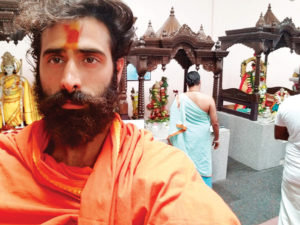
Ishaan’s goal is to establish an Ayurvedic Ecological Village on the foothills of Himalayas, somewhere in Uttarakhand. He doesn’t want to reveal the details, but he has a plan ready — cowdung and urine would enrich the fields. He’s a regular in Delhi’s farmers’ markets, moves around with a bottle or two of cow/goat milk— fairly Gandhian in that sense — eats only organic food. Though it has not been a smooth ride, he lost a lot of weight and has now started eating meat — his body needs protein reinforcement.
He’s not one of the delusional nirvana-seekers, escaping the familiar to make something out-of-this world happen. He’s got his head in the right place, leads a fairly radical lifestyle, is a doer. He’s the odd one out and perhaps that’s what makes him conscious of the fact that he’s a “foreigner (though is more native than most natives) in Delhi” and bad things are lurking to happen.
But this feeling has not prevented him from trying to get in sync with the “flow of life” in a very organic way. For he has seen that consumerist America is suffering from obesity and depression and urban India is following in the same footsteps. People like him are the harbinger of traditional and sustainable, fairly rural lifestyles. He’s one of that rare set of people who exemplify what they preach to the world.





